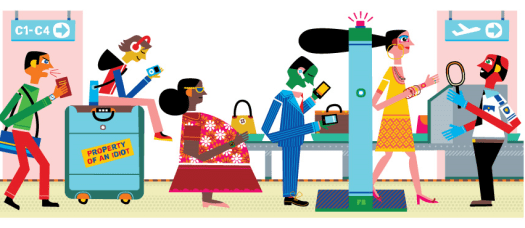
I spent much of my first summer in London in 1980 standing in the queue at the back of the Albert Hall for the BBC Proms (I had more patience and energy when I was 22). If you wanted a good vantage point you had to be there by 4pm, though for the more popular programmes it had to be the night before. All in all, you’d be standing for six hours at least, if you count the concert itself, though the more professional Prommers were equipped with collapsible camping stools, thermos flasks, and so on. There’s a lot of oneupmanship when it comes to Promming.
For three hours or so, before you bought your ticket, you couldn’t go anywhere. The most annoying aspect of this was the ‘chuggers’, the good people collecting money for charity, though I don’t think that’s what they were called back then. They lacked the big buckets that today’s kind hijackers carry. Of course, they were well-meaning young people and I don’t doubt they were collecting money for excellent causes.
And they were in chugger heaven chugging the Prommers behind the Albert Hall. We were relatively rich and easy pickings, I suppose. And there was no possibility of escape, save by forgoing some particularly wonderful and obscure piece by Stockhausen, Cage or Ligeti, pieces I’d been longing to hear since infancy. The chuggers had us, as Molesworth might have put it, ‘like a Treen in a disabled spaceship.’
They usually worked backwards from the head of the queue, methodically and determinedly, and, of course, nearly everyone gave them something. Most would have felt embarrassed not to. The moral pressure was almost irresistible.
Only I hated, even then, doing something just because it was expected of me. The greater the moral and peer pressure exerted, whatever the cause, the more I wanted not to. So usually I didn’t.
‘You don’t think this is a deserving cause?’ they’d ask.
‘Do I have to explain myself?’ I’d say, and you could see them beginning to enjoy themselves. Torturing a refusenik like me was what made chugging fun.
‘I think you do,’ they’d say. ‘After all, everyone else here is giving, and I’m sure you’re as comfortably off as they are. Is it that you just don’t care about people/donkeys/the Amazon rainforest/injured soldiers/cystic fibrosis/torture/rococo plasterwork/the overuse of hydrocarbons?’ And so on.
The more there was of this sort of thing the more I dug my heels in, however contemptuous the looks of the Prommers to the right and left of me.
Then, and now, if I give time or money to charities (which I promise you I do, from time to time), I like to do it authentically, not because everyone else does it. Acting authentically (after all, existentialism was fashionable in the early 1980s) was important to me then, as now.
I was reminded of this by my friend Jo Weaver’s blog, yesterday, in which she writes about the ‘flag-shamers’ and ‘clap-shamers’ who terrorise the meanies who don’t ‘join in’ in the UK. If you didn’t fly a flag on VE Day or don’t clap the NHS on Thursday evenings you’re as likely as not to be abused by your neighbours.
Whatever happened to tolerance and minding your own business?
I’d never thought of the UK as a totalitarian state, where conformity in thought and deed is a requirement of citizenship. If I were in London I probably would clap the NHS on Thursday evenings, but I don’t think I’d fly a flag on VE Day. If I did neither it would be no one’s business but my own.

